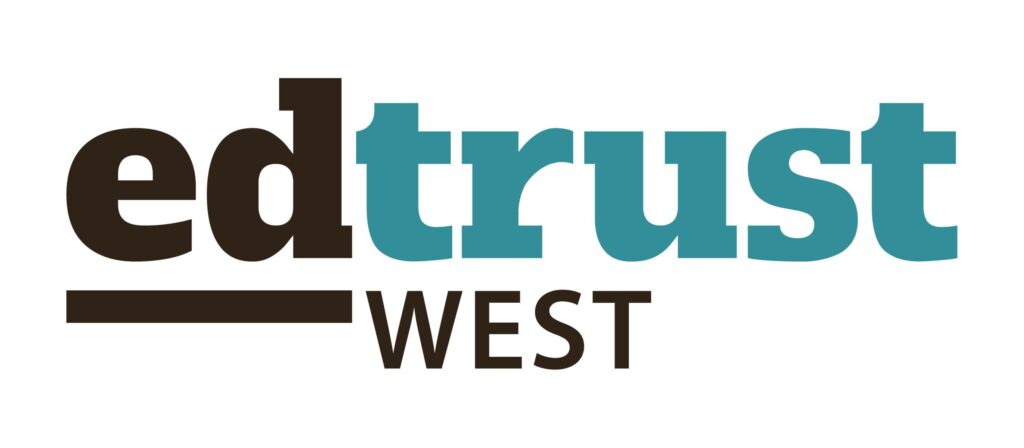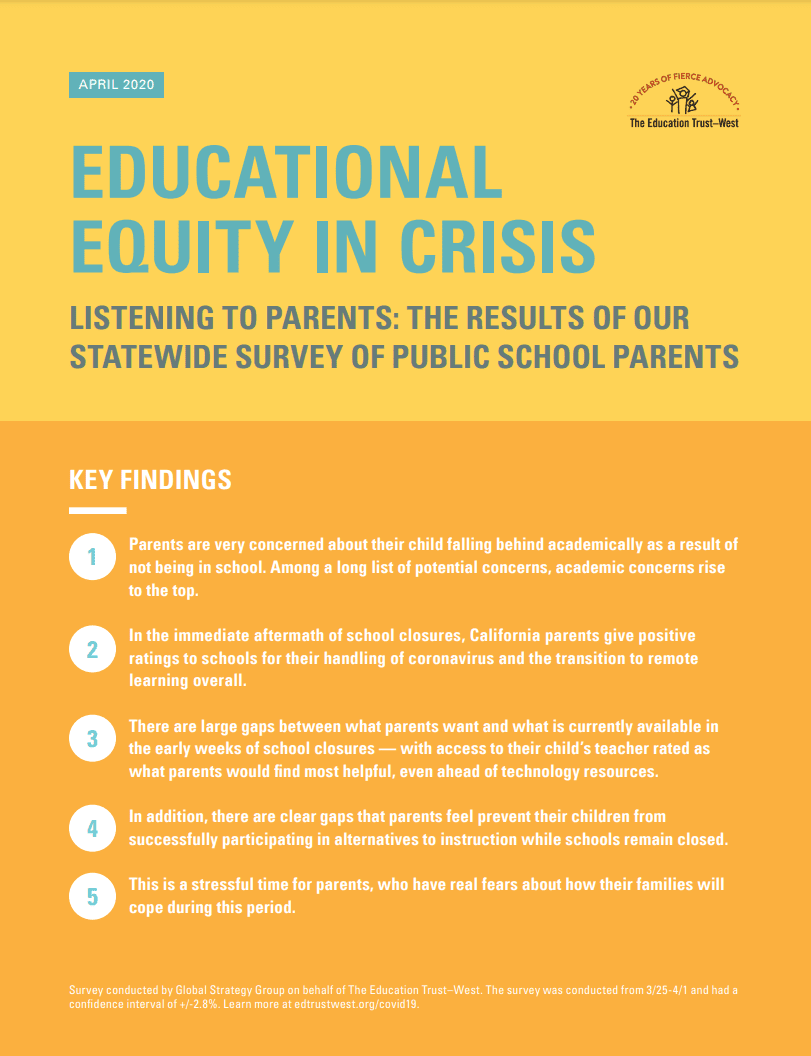Poll Results Show California Parents Very Concerned About Children Falling Behind During School Closures
Parents are very concerned about their child falling behind academically as a result of not being in school. The Education Trust–West partnered with Global Strategy Group to conduct a poll that tested a long list of potential concerns among parents admist the coronavirus pandemic and found academic concerns rose to the top. Results are driven by parents in the greater Los Angeles area as well as low-income parents, who worry that being out of school will be a major setback for their child. This is especially seen among parents of high school students, who are not only concerned about falling behind academically, but whether their child will still be on track to attend college. Financial concerns also top this list, particularly for African American and low-income families. Their child’s sense of feeling bored and under-stimulated are also top concerns and rise to the same level of urgency as financial worries. Top concerns among parents are outlined in the table below:
In the immediate aftermath of school closures, California parents give positive ratings to schools for their handling of coronavirus and the transition to remote learning overall. Eight in ten parents say their child’s school is doing an excellent or good job handling the coronavirus (81%), but rate slightly lower for making learning materials available to students (75%). Parents give high ratings to public schools throughout the state, with very little differentiation between Los Angeles and the surrounding area, the rest of the state, and urban areas outside of Los Angeles. About half of parents (47%) report receiving “a lot” of information from their child’s school or school district about resources and support that are available to them while schools are closed, and 83% say they have been receiving information from their child’s school at least once a week – and more than half (54%) say they receive information three times a week or more. Parents are navigating a new reality and generally support their local schools, even as parents’ needs in many cases diverge from what their schools are currently providing, as described below:
There are large gaps between what parents want and what is currently available in the early weeks of school closures – with access to their child’s teacher rated as what parents would find most helpful, even ahead of technology resources. We tested an extensive list of things schools could do to help support parents and students and found parents particularly receptive to all the proposed options. As schools navigate this new landscape over the next several weeks, policymakers and administrators should look to close the – rather sizeable – gap between the things schools have put in place during this period (in dark blue below) and things parents feel would be most helpful as remote learning continues (in light blue below). At the top of parents’ list is regular contact with or access to their child’s teacher, which less than half (45%) of parents say their child’s schools have made available.
In addition, there are clear gaps that parents feel prevent their children from successfully participating in alternatives to instruction while schools remain closed. With 81% of parents reporting that their school district is currently using or will soon use remote or distance learning, it is important to note that low-income parents are less likely to say distance learning has been successful (59% rate the experience at an 8-10 out of 10) than parents who earn more than $50,000 per year (65%). For both remote or distance learning and other alternatives to classroom instruction, we have outlined the most pressing issues below:
- Not enough devices in the home. Among parents who are not confident that their child will be able to participate in remote or distance learning, not having a computer or tablet or enough available devices (i.e. if parents are working remotely and need access to the family’s computer, etc.) is a top barrier (41% say this applies to them). Sixty-four percent of parents statewide say that schools lending mobile technology devices like iPads would be very helpful for families like theirs. Among African American families, that number rises to 71%, with families who have a household income of less than $50,000 per year at 69%, and 67% of parents located in the North of the state reporting this would be very helpful. Overall, only about a third of parents (37%) say their child’s school has lent mobile technology devices to families in response to the coronavirus.
- Lack of reliable, high-speed internet. Lack of reliable internet access is another top barrier for families who feel less than confident that they will be able to participate in distance learning (29%). This issue is particularly common for families in the North of the state (47%), low-income families (38%), Hispanics in the Los Angeles suburbs (35%) and families located in the Los Angeles suburbs in general (34%). Two-thirds of parents (67%) say providing free internet access to families while schools are closed due to coronavirus would be very helpful for families like theirs, yet only 20% of parents report that their school district has made this available for students.
- Subjects beyond math and reading/English. Math (88%) and reading/English (85%) are the most common subjects covered by the learning materials families have received so far. Schools should look to close this gap and get to 100% in both subjects, as even this level of adoption means at least one out of every ten children in the state is not receiving learning materials in reading or math at this time. Beyond this, there is a significant drop-off across the state: science (59%) and social studies (56%) make up a second tier while other subjects like world languages (27%), physical education (26%), and music and the arts (24%), are getting significantly less attention. More than eight in ten (84%) parents say they are concerned about their child feeling bored or under-stimulated at home, suggesting efforts to bridge this gap would be greatly appreciated by parents and students.
- Closing technological barriers. Twenty-three percent of parents statewide, including 29% of parents in the Los Angeles suburbs, 32% in the Valley, and 31% in the North say they do not know how to use the remote/distance learning software that has been provided. Just 65% of parents would give themselves a letter grade of an A or B in terms of tech savviness, so helping parents navigate these platforms in the early phases of this transition will be important.
- Support for non-native English speakers and English learners. This is a significant barrier to remote learning for many parents. A quarter (25%) of non-English home speakers say their child’s school has not provided materials in other languages. Navigating remote learning software can be challenging even for English-speaking parents, so making accommodations for non-native English speakers and English learners should be a top priority as schools look to reach full participation in remote learning in the weeks ahead.
- Supporting parents of children with disabilities. As we note below, parents of children with disabilities report particularly higher levels of stress than usual as a result of the crisis, with 44% reporting much higher levels of stress than usual (compared to 35% among parents overall). Parents of children with disabilities are also particularly concerned with ensuring that their child does not fall behind academically while at home (72% say this is very concerning, compared to 65% of parents overall).
- Providing access to meals. Seventy percent of parents report that their child’s school is providing free breakfast and/or lunch for students while school is closed, which means almost a third of parents either do not have access to this essential resource or do not know that it is already available. This is particularly concerning in both the northern and southern regions of the state: just 64% of parents in Los Angeles and 66% of parents in the North say their school is providing meals for students while schools are closed. There is also a distribution gap, with most schools making meals available for pickup (76%) – while only 5% say their school is offering meal delivery, though this is higher in the northern region of the state (11%).
- Advance planning. Schools, parents, and the American public are all in the same boat, navigating this crisis on a day-by-day and week-by-week basis. However, as it looks more and more likely that schools will continue to be closed, educators should look to equip parents with the tools to plan ahead. A majority of parents (58%) say the materials they have been provided do not extend beyond two weeks of instruction.
This is a stressful time for parents, who have real fears about how their families will cope during this period. Eight in ten (80%) public school parents report higher levels of stress than usual, including 35% who say their level of stress is much higher than usual. Acute feelings of stress are particularly common among parents of children with disabilities, parents living in Los Angeles, and lower-income families.
About this poll:
Global Strategy Group partnered with The Education Trust–West to conduct an online (desktop and mobile) survey among 1,200 parents of children in California public schools from March 26th to April 1st, 2020. Key findings from the research are outlined above.
The survey had a confidence interval of +/-2.8%. All interviews were conducted via web-based panel. Care has been taken to ensure the geographic and demographic divisions of public school parents are properly represented.
For more education equity-centered resources and responses, click here.


